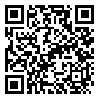Volume 5, Issue 18 (2008)
FSCT 2008, 5(18): 27-36 |
Back to browse issues page
Download citation:
BibTeX | RIS | EndNote | Medlars | ProCite | Reference Manager | RefWorks
Send citation to:



BibTeX | RIS | EndNote | Medlars | ProCite | Reference Manager | RefWorks
Send citation to:
Inhibition of Listeria Monocytogenes Growth by Lactic Acid Bacteria in Strile Cold Smoked Roach (Rurtillus frisii kutum ). FSCT 2008; 5 (18) :27-36
URL: http://fsct.modares.ac.ir/article-7-6951-en.html
URL: http://fsct.modares.ac.ir/article-7-6951-en.html
Abstract: (5120 Views)
The aim of this study was to demonstrate the inhibitory capacity of two strains of gram positive bacilli, isolated from intestinal content of Persian sturgeon, against Listeria monocytogenes growth. Two strains Lactobacillus casei AP 8 and Lactobacillus plantarum A P 12 , were screened for their antilisterial activity against. L. monocytogenes, using a disk diffusion agar test. However, L. casei AP 8 always had the highest inhibitory effect. The spoiling potential and antilisterial capacity of bacterial strains was tested in sterile cold smoked roach (CSR) blocks inoculated with 104 CFU g− 1 of lactic bacteria and 102 CFU g-1 of Listeria monocytogenes and then stored for 10 days at 4 °C followed by 30 days at 20 °C. L. casei AP8 grew a little faster L. plantarum A P 12 and none of them showed any adverse effect on quality of the product ( i.e. no total volatile basic nitrogen (TVBN) production and no acidification. Lactobacillus casei AP8 was the most efficient strain, maintaining the level of L. monocytogenes at <50 CFU/ g during 40 dayss of storage at 4 and 20°C. In conclusion, biopreservation of cold smoked roach using bacterial cultures such as L. casei AP8 is a promising way to inhibit the growth of pathogenic bacteria such as L. monocytogenes with low effect on the product quality.
Keywords: Listeria monocytogenes, Biopreservation, Cold smoked roach, Lactobacillus casei, Lactobacillus plantarum
Received: 2008/04/21 | Accepted: 2009/01/9 | Published: 2012/09/3
| Rights and permissions | |
 |
This work is licensed under a Creative Commons Attribution-NonCommercial 4.0 International License. |





